REMEMBERING WONG KOK MEE
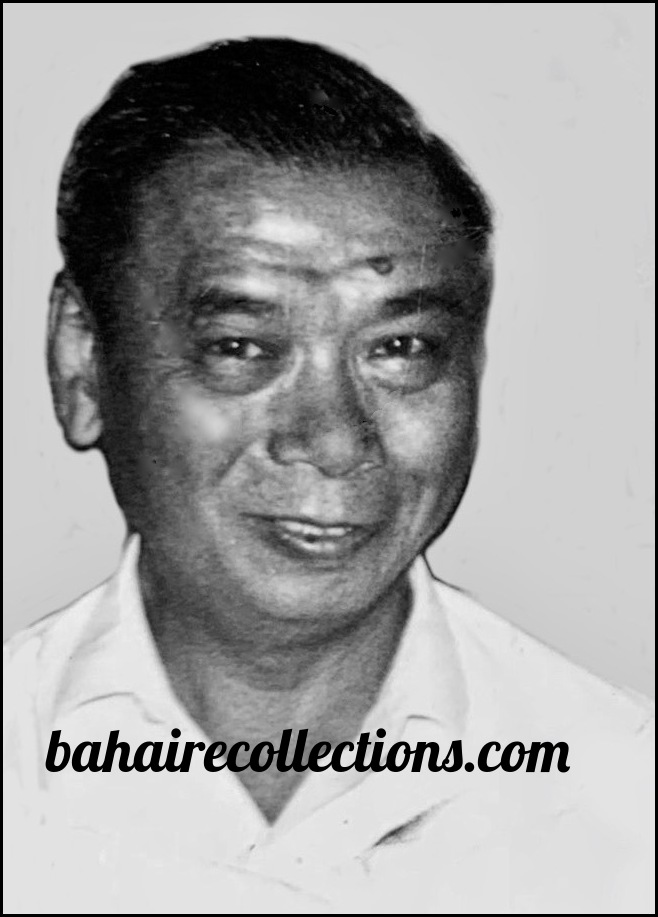
16 June 1911 to 28 October 1972
This is the story of a rare kind of believer, one who had an unbounded love for the Faith of Baha’u’llah. The story reveals the great pain, difficulties and challenges a true lover had to go through – all for the love for the Blessed Beauty and His mighty Cause. Seldom would one come across a pure, sincere and dedicated soul to whom the Faith was his all.
As soon as Yankee Leong accepted the Faith in Seremban on 19 December 1953, he set out to share the Healing Message of Bahá’u’lláh with his closest friends, starting with the capital city of Kuala Lumpur. In Kuala Lumpur, he organized talks in the business premises of his close friend and Theosophist, Mr. Wong Kok Mee, affectionately called “Uncle Wong” by the youngsters and Kok Mee by his peers and other elders.
The first believer in Kuala Lumpur was Mr. W. Nadarajah, a clerk with the Kuala Lumpur Municipality who accepted the Faith on 21 December 1953, just two days after Yankee Leong himself became a Bahá’í. The next to accept the Faith in Kuala Lumpur was Mr. Wong Kok Mee who signed up on the declaration card on 8 April 1954. Wong Kok Mee was the Chief Salesman in M/S James Warren & Co., in Kuala Lumpur. Among the first batch of believers, it was Kok Mee alone who rose to become the towering figure in the early days of the Faith in Kuala Lumpur.
Kok Mee had always wanted to know more of the Faith and gained a deeper understanding from the foreign visitors and pioneers to the community and other learned believers, including the Hands of the Cause of God. With a burning thirst for knowledge on the Faith, Kok Mee read widely whatever material was available and spent his time understanding the Faith. In 1955 itself there was a good lending library with a good number of books. Kok Mee was one of those who frequently borrowed a good number of books to gain a wide and deeper understanding of the Faith.
With the strong encouragement of Mrs. Shirin Fozdar India’s pioneer to Singapore and Yankee Leong in Seremban, Kok Mee taught the Faith to his friends in Kuala Lumpur. Once a sufficient number of adults had been enrolled into the Faith, the first Local Spiritual Assembly of Kuala Lumpur was elected on Ridván 1955 at the home of Mr. Nadarajah. Nadarajah became the Chairman, Kok Mee the Vice Chairman, and Mrs. Shirin Fozdar its Secretary. Shirin Fozdar stayed briefly in Banting in early 1955 and was travelling to Kuala Lumpur for Bahá’í functions. Within one year of its formation, the Assembly was registered under the Societies (Regulation) Rules, 1953 on 16 May 1956.
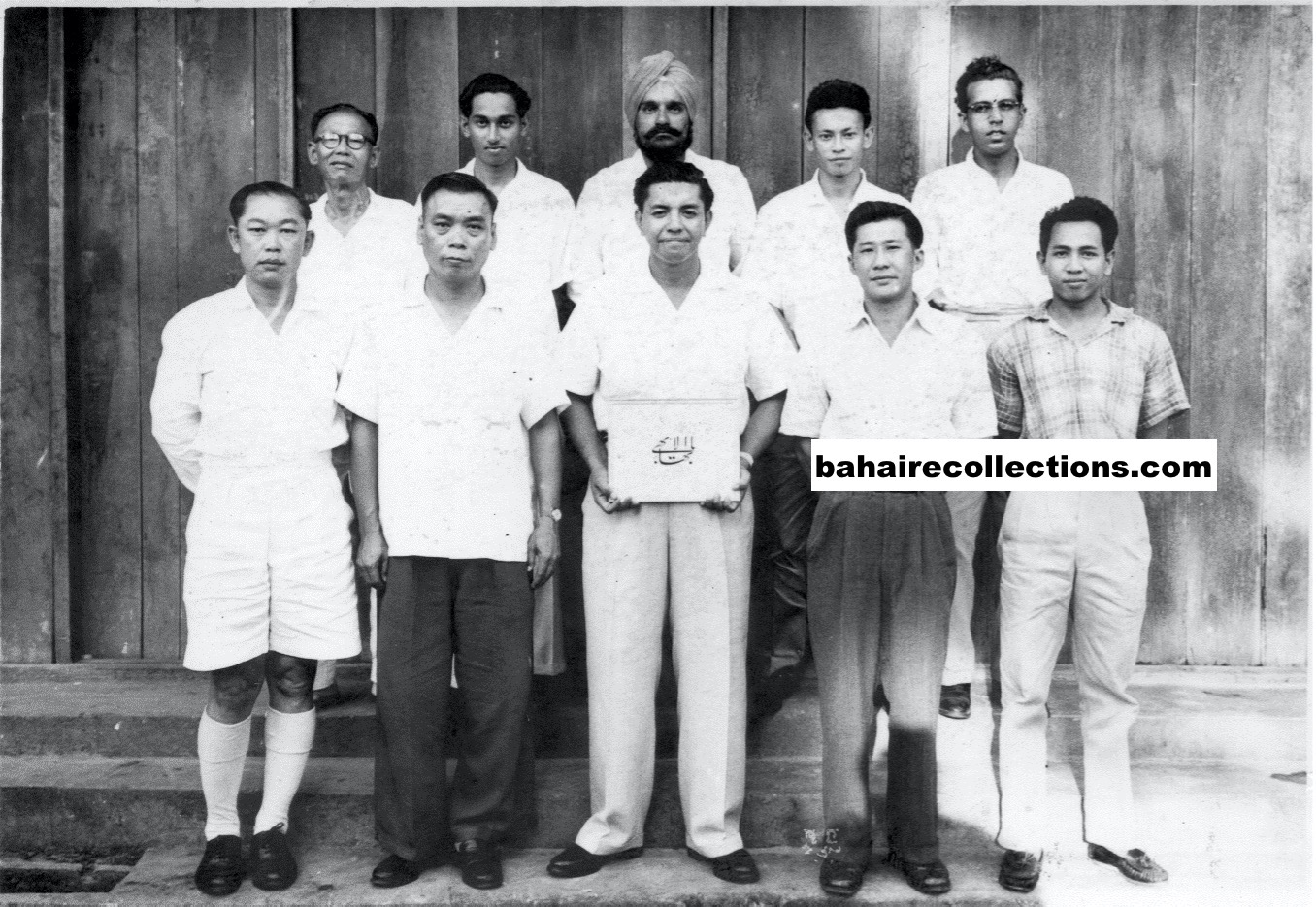
The earliest batch of believers in Kuala Lumpur in 1955, taken in front of the business premises of Wong Kok Mee, who stands second from left in the front row. The believer with the turban in the second row is Harnam Singh Rakha, who, along with a few others took the Faith to the Asli settlement in Dusun Tua area in 1957
Yet the re-elections of the Local Spiritual Assembly of Kuala Lumpur each subsequent year was not that smooth, as it was a busy city with a mechanized hustle and bustle way of life. Most of them were swept away by the materialism of city life. The coming together of believers was difficult and re-election of the existing Assembly at each Ridván period was not easy. Yet Kok Mee was highly committed, and he tried his very best to exert every ounce of his energy to have the re-election accomplished. In the late 1950s, it was a formidable task until S. L. Thevar moved into the Kuala Lumpur community from Penang and served on the Assembly as an able Secretary in 1960. That happy moment for Kok Mee did not last long when Thevar was transferred to Temerloh in the state of Pahang in 1961.
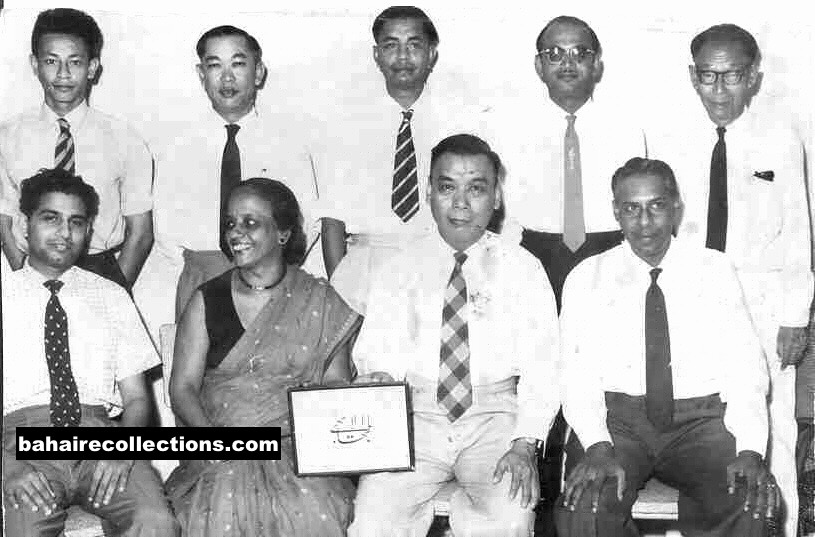
Local Spiritual Assembly of Kuala Lumpur in 1960. Seated L-R: Maheshwar Dayal, Mrs. Emma Fernandez, Wong Kok Mee, and S.L. Thevar
With the lack of adult believers, the Local Spiritual Assembly of Kuala Lumpur was made up of Bahá’ís from Petaling Jaya as well in 1962. There was a period of inactivity from 1962. The burden to keep the fort of the community once again fell upon the sole torch bearer, Kok Mee. It was only in 1965 that a new life came to Kuala Lumpur when the National Bahá’í Centre was occupied. The Secretary of the National Spiritual Assembly S. Vasudevan moved into the National Bahá’í Centre in Kuala Lumpur in December 1965 and he recollected that there was again not much going on the part of the Local Spiritual Assembly. Yet, whenever the Local Spiritual Assembly was elected Kok Mee too was elected on to the Assembly, the last year being 1970. As a member of the community, he had worked very hard to keep the spirit high. He used to buy ample meals for the Feasts to bring happiness and joy during the social part of the Feasts.
All these years Kok Mee had been holding the fort all himself with so much burden and challenges. The year that brought some relief to Kok Mee was 1969. Inbum Chinniah, Secretary of the National Spiritual Assembly who was based in Jasin moved into Kuala Lumpur at the end of 1968 and re-organized activities and affairs of the Faith in Kuala Lumpur. A much stronger Local Spiritual Assembly started to emerge from 1969 with a dynamic set of new blood. Kok Mee was able to come to the National Bahá’í Centre that also housed the Local Spiritual Assembly of Kuala Lumpur, with an elated heart to see so many friends coming and going. He had more friends to talk to and was often at the home of his dearest friend Inbum Chinniah with whom he discussed many affairs of the Faith. The National Spiritual Assembly set up a set of Administrative staff to assist Inbum Chinniah in his secretarial services. Most of them stayed in the National Centre itself. Some regular teachers in the aboriginal areas also stayed in the Centre. The Centre became a hive of activities, as never before. Finally, the time had come for him to relax, for the first time, after some 15 years of constant and strenuous struggle to keep the torch burning with all his mighty efforts. When there was nobody staying in the Centre in the past Kok Mee used to come to the Centre almost every day.
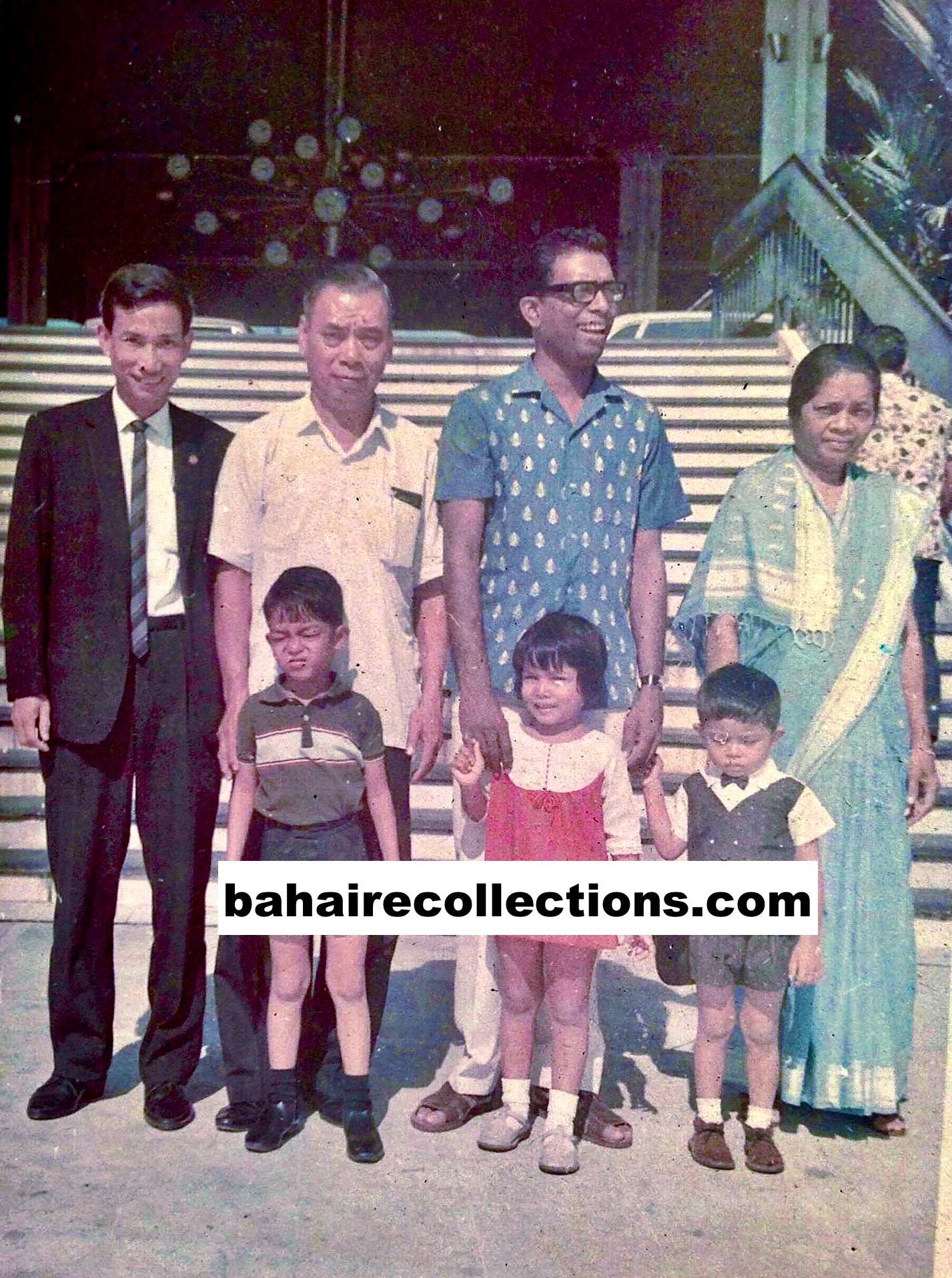
Subang International Airport, 1969. L-R: Le Loc, member of the National Spiritual Assembly of Vietnam, Wong Kok Mee, Inbum Chinnah, and Mrs. Elizabeth Thurairatnam (mother of Inbum Chinniah) The three children of Inbum L-R: Nabil, Saffura, and Soheil
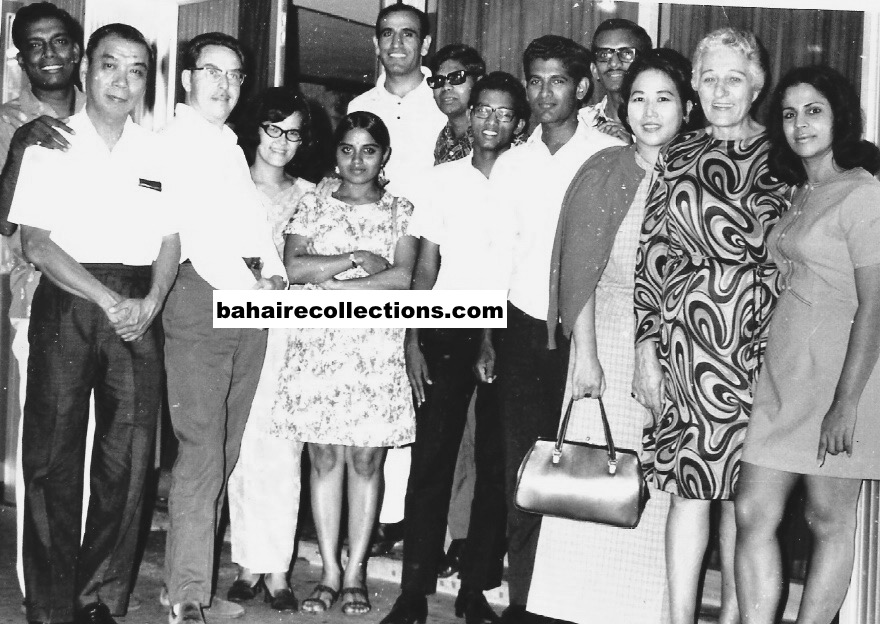
Visit by Dr. S. I Dean and wife to Kuala Lumpur, 1970. L-R: Inbum Chinniah, Wong Kok Mee, Dr. S. I. Dean, Lean Beng Liew, Suguna Arumugam, Nasser Jaffari (pioneer to Thailand) A.P. Arumugam, Govindasamy, Isaac D’Cruz (Seremban) S. Ravichandran, Lily Chinniah, Mrs. Isabelle Dean, and Auxiliary Board member Betty Fernandez
From 1969 there was a self-sustaining momentum, and Kok Mee reduced the frequency of his visits. But each time he came, he was never empty-handed, as he knew there were staff serving with a simple allowance. Mr. Sandrakasan who was a staff in the National Centre from 1969 to early 1972 says, “Uncle Wong would always come to the National Centre with plenty of food and leave them in the kitchen for us to eat. The food he brought during his morning visits would be more than sufficient for lunch serving as well. Whenever he hosted Feasts, it was like a huge festival with so much food. He had a magnanimous heart.’’
In the early days, Kok Mee played a key role in providing a meeting place for the community. A meeting place for the community became a key issue from the time of the election of the Assembly in 1955 and it was Kok Mee who came to the fore. As an Assembly was elected in 1955, a need arose for the meetings of the assembly, and community activities as well. The first Assembly meeting was held in the Tivoli Hotel in Kuala Lumpur. But this was not to continue forever, as it involved huge expenses. Kok Mee generously offered his business premises at Rodgers Road in Kuala Lumpur became the place for both Assembly meetings, community gatherings and public meetings. That became the first meeting place for community gatherings. The other business premises of Kok Mee at Rogers Street and Clarke Street were also used for meetings. In 1960 the residence of Mrs. E. A. Fernandez at Cheras area was used for Bahá’í meetings. When Maheshwar Dayal a pioneer from India to Singapore came to Kuala Lumpur in 1958, he was employed as Advertisement Manager with Lever Brothers and stayed at Khemoj Road, Off Bangsar Road. When his shophouse also became a meeting place, Kok Mee brought some chairs and tables for this shophouse. Following the wedding of Maheshwar Dayal in 1961 he moved to Petaling Jaya, and once again Kok Mee’s office at Rogers Street became a meeting place. Kok Mee was there for the needs of the Faith. The outstation Bahá’ís like Leong Tat Chee and Yankee Leong used to stay overnight in this office whenever they had to pass through Kuala Lumpur to proceed to the north.
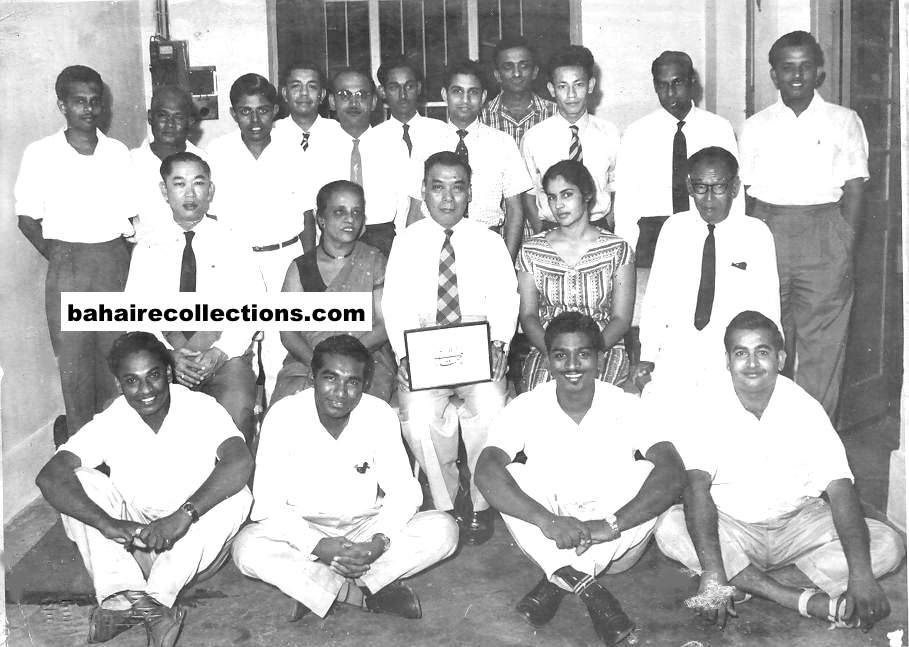
Visit of some Malacca believers to Kuala Lumpur, 1960. Seated in the centre is Wong Kok Mee, with Mrs. Emma Fernandez (mother of Tony Fernandez of Malacca) to his right, and Betty of Malacca to his left. Standing at extreme right is Tony Fernandez from Malacca, with S.L. Thevar next to him. Seated second from left on the floor is Raymond Peter from Malacca, and seated at extreme right is Surinder Singh from Malacca.
One more area of Kok Mee’s love for the Faith was demonstrated in the way he took loving care of the National Bahá’í Centre. In April 1965, the National Spiritual Assembly and the Local Spiritual Assembly of Kuala Lumpur were housed in the newly purchased National Ḥaẓíratu’l-Quds at 32, Jalan Angsana, Kuala Lumpur. Although this bungalow house was donated to the National Spiritual Assembly by Mrs. George Lee, a Bahá’í philanthropist residing in Singapore, it was only in April 1965 that it came to be formally occupied.

Dr. Muhájir discusses with Mrs. George Lee of Singapore who, in 1964 donated the bungalow at 32, Jalan Angsana to be used as the National Bahá’í Centre. To her right are Wong Kok Mee and K. Rajah.
Kok Mee immediately took loving ownership of this building and took it upon himself to ensure it had its due image, befitting the glorious Cause of Bahá’u’lláh. History would view Kok Mee as the most committed caretaker of the Bahá’í Centre. Kok Mee was one of those who had the keys to the National Bahá’í Centre, as a member of the National Centre Maintenance Committee. He used to come often to the Centre and stay on for a few hours and take personal responsibility to clean the centre and maintain it. S. Vasudevan who was in the Bahá’í Centre from December 1965 to May 1967 when he went off to pioneer to India had observed the immense love Kok Mee had for the Faith that was translated into taking care of the Centre. Before Vasudevan moved into the Center, and after he had pioneered to India, Kok Mee would come to the Centre almost every day, enter every room and carefully inspect the needs of the Centre and swiftly attended to them. Every fused bulb in the centre was replaced by Kok Mee. He brought in electricians and plumbers to ensure the wiring and piping systems were in good order. He would then walk outside the building and ensure no dried leaves, twigs or dirt were to be seen. He would take the broom and sweep the surrounding compound in broad daylight, oblivious to members of the public passing that way. He quietly settled the water and electricity bills from his own pockets. To Kok Mee, perhaps the Bahá’í Centre a very sacred place, much dearer than the residence in which he lived.
There is every reason for the earliest batch of believers to register the name of Kok Mee in their hearts as he was equally moving around with them in those earliest days on several platforms. While Kok Mee was the torchbearer in Kuala Lumpur, he also participated in regional gatherings held in other parts of the country. He attended the first Summer School held in Malacca in December 1957, where he met the Hand of the Cause of God Dr. Raḥmatu’lláh Muhájir and several key believers of the time such as Dr. K. M. Fozdar, Mrs. Shirin Fozdar, G. Saurajen, Anthony C. Louis, Lena Saurajen, Nong Chik, Mirinal Kanti Paul, Tushar Kanti-Paul, Pijush Kanti Paul, Kumara Das, Yankee Leong, K. Rajah, Chin Chia Kwei, and Leong Tat Chee. Also present were American pioneers to Nicobar Islands Miss Jeanne Frankel and her mother Mrs. Margaret Kelly Bates. It was at this meeting that Dr. Muhájir gave an eleven-point program which became the Blueprint for the development of the basic spiritual infrastructure for the country. Wong was impressed by that master plan emanating from the brilliant mind of Dr. Muhájir.
Kok Mee participated in the meeting of the Regional Spiritual Assembly held in Singapore in Ridvan 1958 and in the Inter-Continental Conference held in September that year in the same city. Belonging to the first batch of believers in the country, he was well known to all of them, as a quiet worker behind the scene.
Kok Mee became very attracted to Dr. Muhájir at that first summer school and both remained very close friends until the passing of Wong in 1972. Dr. Muhájir himself had a fond liking for the dedicated services Wong had provided to the development of the Cause in the Kuala Lumpur community.
In 1958, Kok Mee participated in the National Convention of the Regional Spiritual Assembly of South East Asia at Mrs. George Lee’s Pasir Panjang villa in Singapore. There he widened his circle of friends. Kok Mee also participated in the First Pan-Malayan Teaching Conference held on 8 May 1960 at Happyland Hotel in Klebang Kecil, Malacca. This Conference was graced by the Hand of the Cause of God Dr. Muhájir. He also participated in most of the Bahá’í Summer Schools and the National Bahá’í Conventions, always quietly sitting in a corner and observing the proceedings that were going on with keenness.
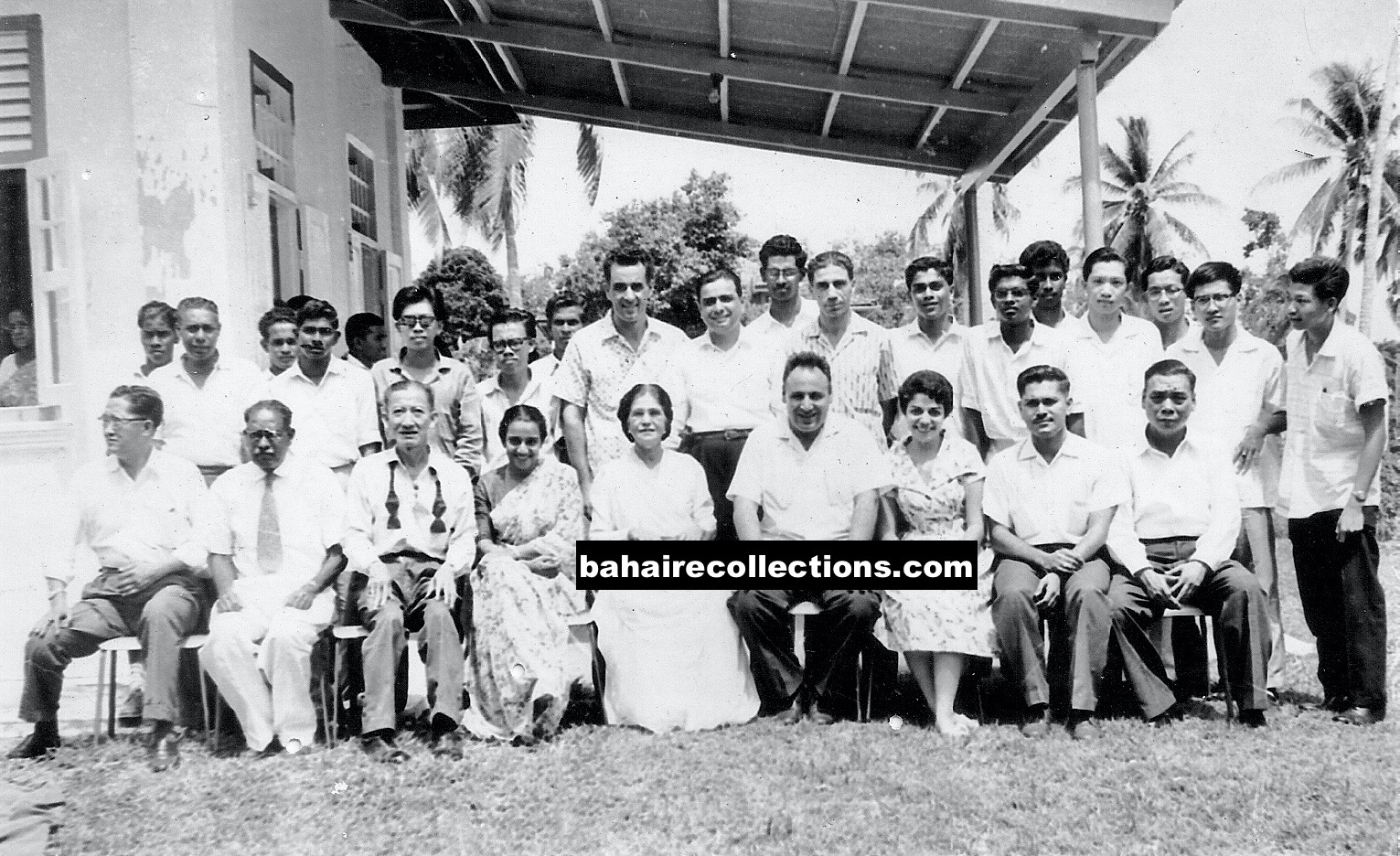
Summer School held in Port Dickson in 1960. Seated L-R: Leong Tat Chee, K. Rajah, Yankee Leong, Mrs. Shantha Sundram, Mrs. Shirin Fozdar, Dr. Muhájir, Mrs. Iran Muhájir, Jamshed Fozdar, and Wong Kok Mee.
Whenever visitors came to the Centre or to the neighbouring Furlong House to meet the community, Wong would arrive earliest and ensured good table cloths were spread out on which he makes some floral arrangements.
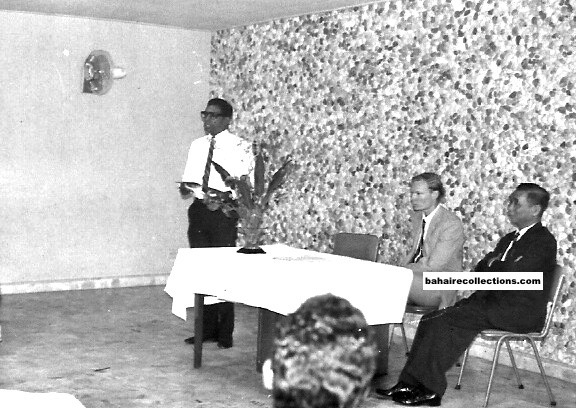
Inbum Chinniah standing at the left, welcoming a guest at the Forlong House, 1970. Seated on the right is Wong Kok Mee
Kok Mee was viewed to be a very committed and responsible believer on whom many responsibilities were entrusted. In 1960 when the National Centre Building Committee was officially formed to expedite the acquisition of a Bahá’í Centre in Kuala Lumpur, Kok Mee was appointed to the Committee. In 1965, he was appointed to the National Centre Maintenance Committee. The National Assembly appointed him on the Temple Site Committee in 1966; the Pioneer Committee in 1967; the Finance Committee in 1968; and the Bahá’í Information Service in 1969. In all these committees Kok Mee served with distinction and earned the appreciation of the institutions.
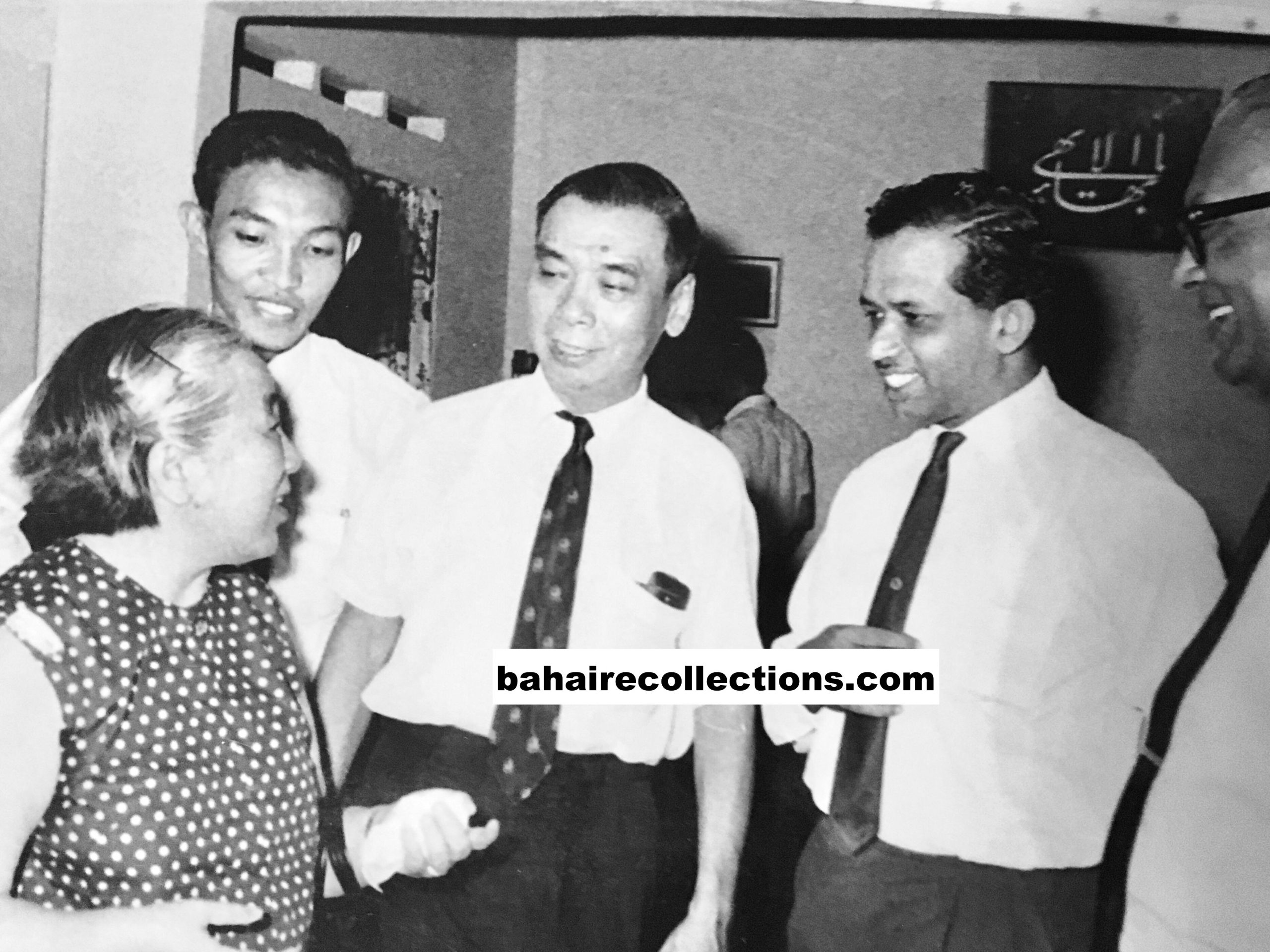
At the National Bahá’í Centre, 1968. L-R: Mrs. George Lee, Choo Yeok Boon, Wong Kok Mee, Tony Fernandez, and Appu Raman
No visitor to Kuala Lumpur from 1955 to his passing in 1972 would have missed the presence or services of Kok Mee. He was there as a pillar in each meeting and gathering. When Mr. Bhaskaran Sanggaran Nair and Mr. Errol Seow Hoon Hin were studying in the Kuala Lumpur Technical College in 1960, Kok Mee was moving with them. He used to visit them in the College and give transport for them to attend functions in Kuala Lumpur. When the Kuala Lumpur Technical College was functioning after the middle of the 1960s, Kok Mee was one of those who gave constant guidance and nurtured the Bahá’ís in this College. He had an old Austin car in which he used to provide transport for the youth to participate in Feasts and other activities in Kuala Lumpur. Likewise, when the University of Malaya Bahá’í Society was formed in the same period, Kok Mee gave the members and the society all the encouragement and financial support for its activities. Kok Mee was the main motivating factor in moving and taking great care of the youths.
One of Kok Mee’s greatest services for the Faith was giving to the fund with no limitation as and when there was a need. When the First Pan-Malayan Teaching Conference was held on 8 May 1960, it was attended by several Bahá’ís, and graced by Hand of the Cause Dr. Muhájir, Kok Mee settled the full expenses of the conference. Hand of the Cause of God Enoch Olinga visited and addressed Kuala Lumpur on the evening of 22 January 1971 at the National Ḥaẓíratu’l-Quds. Since the meeting ran past dinner time, Mr. N. S. S. Silan and Auxiliary Board member Betty decided to take Mr. Olinga for a good dinner. But there was a small issue. The question as to who is to be invited and who would bear the costs had to be considered. Kok Mee who heard of this suggestion insisted that all should be invited, and each could be asked to pay whatever they could. Then they all went for a sumptuous dinner that all enjoyed. After the dinner, a few friends passed the hat around to collect money to settle the bill. Silan who was tasked to provide transport for the revered Hand drove him to the Federal Hotel where he was accommodated. When they went to the cashier’s counter they were informed that someone had just settled the bills in full. When enquired, the cashier pointed to one elderly Chinese man who was limping away at a distance. And that was Kok Mee who had a limp from birth.
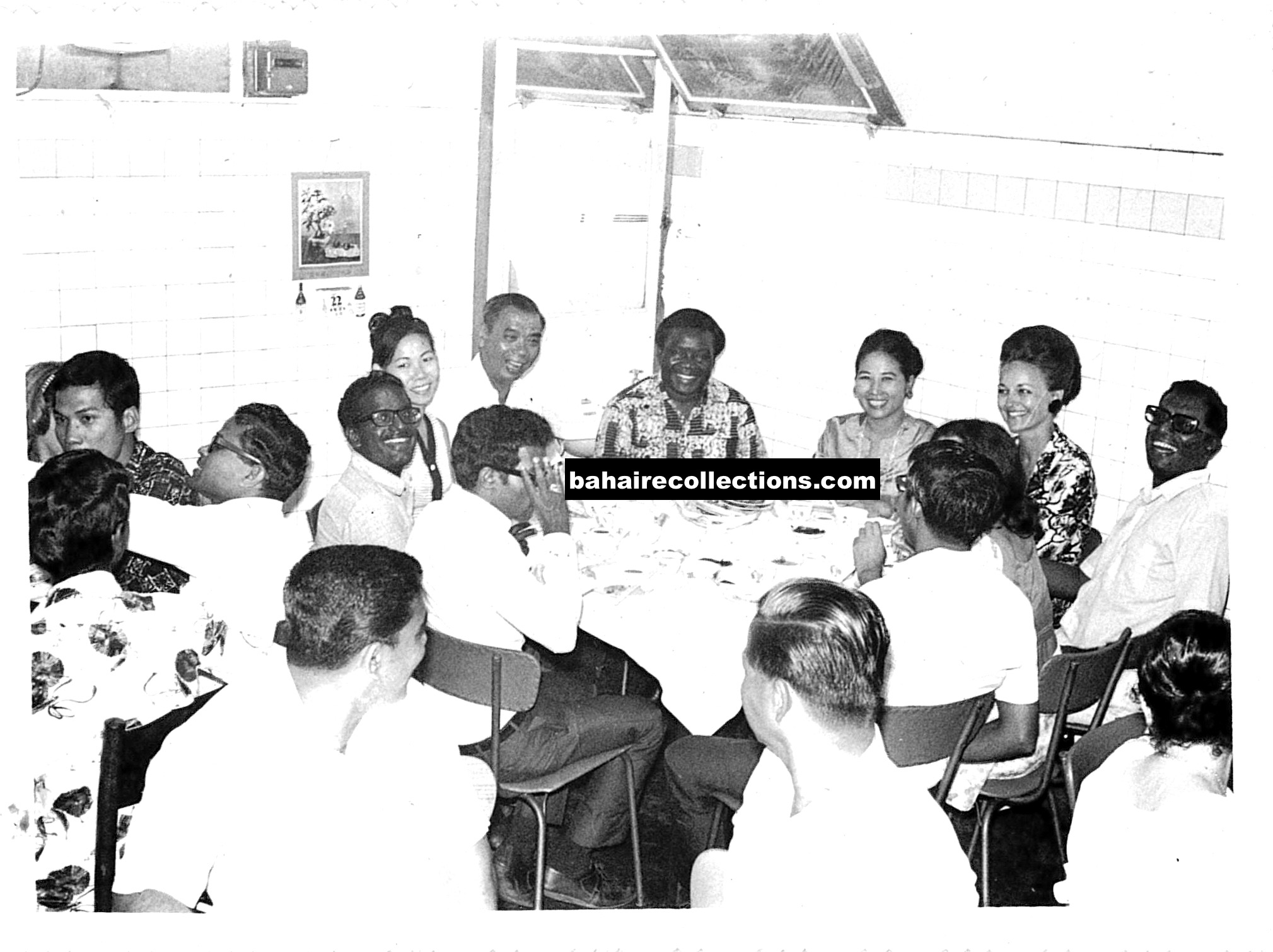
Dinner for Hand of the Cause of God Mr. Enoch Olinga seated in the centre, attired in a “batik” shirt that was presented to him at the community gathering. To his right is Wong Kok Mee. To the left of the revered Hand of the Cause are Lily Chinniah, Mrs. Elizabeth Gibson and Inbum Chinniah. Facing away from the camera on the left is S. Satanam from Seremban.
Whenever there was a need for funds, Kok Mee was almost the first to respond with generous contributions, often without the knowledge of others. He was generous to Bahá’ís and provided financial assistance to those who could not attend Bahá’í conferences held in faraway places. And he would also quietly and without the knowledge of others slip into the pockets of unemployed youths and students some good amount of money to participate in Summer Schools and Bahá’í conferences. He was one of those few Bahá’ís who had a car to provide transport. He used to give transport to almost all the visiting Bahá’ís to Kuala Lumpur, bought dinner for them and sometimes paid for their accommodation. Kok Mee was not a field teacher but always gave financial assistance to those who wished to go teach. He gave much assistance to Yan Kee Leong’s teaching efforts. On 15 May 1967, one night before S. Vasudevan flew off to Ceylon as a pioneer, Kok Mee took Vasudevan for a one-to-one dinner in Ipoh Road and showered praises upon him and gave all the words of encouragement, and did express sorrow for not being a pioneer himself. S. Vasudevan has forever stored this dinner meeting in his heart.
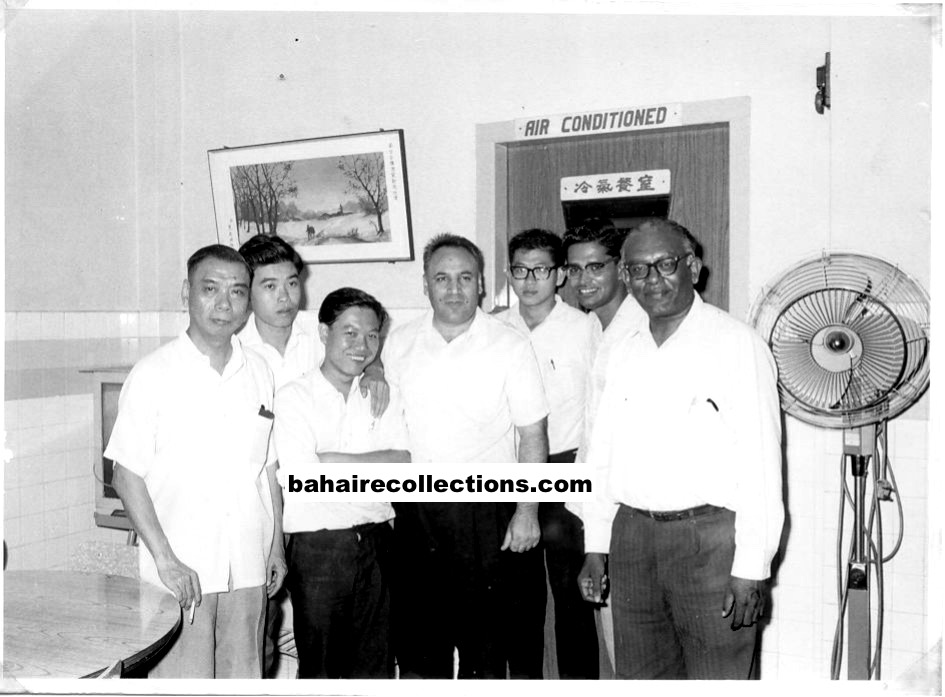
Lunch on Naw-Rúz of 1967 at a restaurant in Kuala Lumpur. L-R: Wong Kok Mee, Lee Wai Kok, Kit Yin Kiang, Dr. Muhájir, Lim Kok Hoon, S. Vasudevan, Appu Raman. It was on this day that Dr. Muhájir appealed to Kit Yin Kiang to pioneer to Taiwan and S. Vasudevan to Ceylon (After one week in Ceylon S. Vasudevan went off to India)
In death too Kok Mee served the Faith. Since 1960 attempts were made to acquire burial grounds for Kuala Lumpur, but the usual administrative red tapes delayed the process. And the urgency was not seen by the authorities as no family of any Bahá’í who had passed away had sought Bahá’í burial from the Local Spiritual Assembly. But the time arrived for a burial ground to be acquired fast. Kok Mee became seriously ill, and the Local Spiritual Assembly of Kuala Lumpur decided to act fast. The issue of Bahá’í burial ground was revisited, this time more vigorously in view of the critical health situation of Kok Mee. The name of Mr. Tony Fernandez, a believer himself and the Officer Commanding the Police District of Petaling Jaya came to the mind, as he had been instrumental in getting citizenship, renewing passports and employment for needy believers at short notice, sometimes within an hour. Through the good office of this most helpful believer, a piece of land was quickly identified. But that too posed a problem. It was a squatter area on which people were illegally settled. To work out the formalities of registering the land and evacuating the illegal settlers would take months or even years. While this became a cause of concern to the Assembly, Kok Mee suddenly passed away on the afternoon of Saturday, 28 October 1972 at his residence in 9, Jalan Pipit, off Ipoh Road, Kuala Lumpur. The community was just reeling from the blow sustained from the passing of Leong Tat Chee, himself a sincere promoter of the noble Cause of Bahá’u’lláh when Kok Mee too ascended to the invisible realms on high. The family was not a Bahá’í. The wife had moved with elderly Bahá’ís like Yankee Leong and Leong Tat Chee and had high respect for the Bahá’ís and respected the belief of her husband. That noble lady immediately turned to the Local Spiritual Assembly for a Bahá’í burial in a Bahá’í burial ground. The Local Spiritual Assembly thanked her profoundly and called for an emergency meeting. Two problems came to the fore. His remains cannot be buried in the proposed Bahá’í burial ground as it was not officially acquired. Secondly, no amount of persuasion with the authorities would work as it was a weekend on which Kok Mee passed away and no government office was open. Even if any officers had wanted to help out, it would take a long time. The Assembly was in the middle of a small crisis. In the existing circumstances, the Local Spiritual Assembly decided to bury his remains in a Chinese cemetery. But some strange turns of events set in situations in our favour-nothing short of divine intervention. By some strange coincidence, Tony Fernandez came into contact with an old friend who was an influential government officer. Tony explained to his friend the dire need for a special burial ground for those professing the Bahá’í Faith. Although being a Saturday he contacted the District Officer in Kuala Lumpur, and on Sunday they quickly visited the Settlement Officer of Lands, who had the final say on such matters. That good officer went to view the land which measured more than an acre and situated on a fruit orchard. It was also on way to our Bahá’í Temple site in Cheras. The officer was satisfied with the location and gave immediate and special permission to have the remains of Kok Mee buried in a grave on that land. Everything happened so fast within a day.
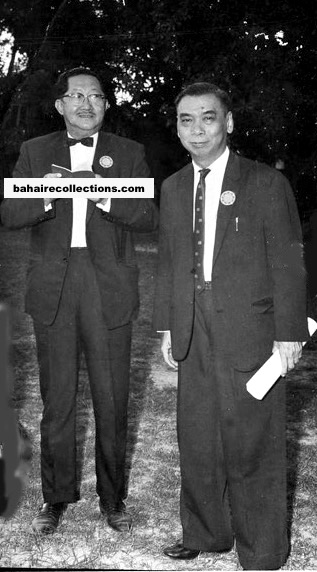
Leong Tat Chee and Wong Kok Mee
The tensed-up Kok Mee family was duly informed, and they expressed much relief. A beautiful and befitting prayer service was conducted at their home. The cortege then proceeded to the new Bahá’í burial ground to have the first Bahá’í burial done there. There was still one more hurdle. The body has to be transported within an hour’s journey in accordance with the Bahá’í laws. Tony stepped in once more, fully aware of the law of the Kitáb-i-Aqdas. Tony, an Officer in Charge of Police District of Petaling Jaya and holding a very senior position of an Assistant Superintendent of Police immediately arranged a police outrider to clear the busy traffic of the city to enable Kok Mee’s remains to be transported to the burial site within an hour’s journey. Kok Mee was given a befitting and VIP send-off. Kok Mee became the first believer of Kuala Lumpur to be given the first Bahá’í burial in the first and newly acquired Bahá’í burial ground. While alive Wong did wonders for the Cause; and in death too he did wonders.
Sometime after the burial of Kok Mee, certain sad and unforeseen development took place. The ownership of the miraculously acquired burial ground posed some documentation issues, and there was uncertainty surrounding the future of the burial ground. The Wong family too saw this sensitive situation and exhumed the remains of Kok Mee with permission of the authorities and reburied them in a Christian burial ground in Cheras, Kuala Lumpur. Some Bahá’ís were there on the day the body was exhumed and offered prayers. The burial ground, the first in Kuala Lumpur allotted for the Bahá’ís was repossessed by the Kuala Lumpur Municipality.
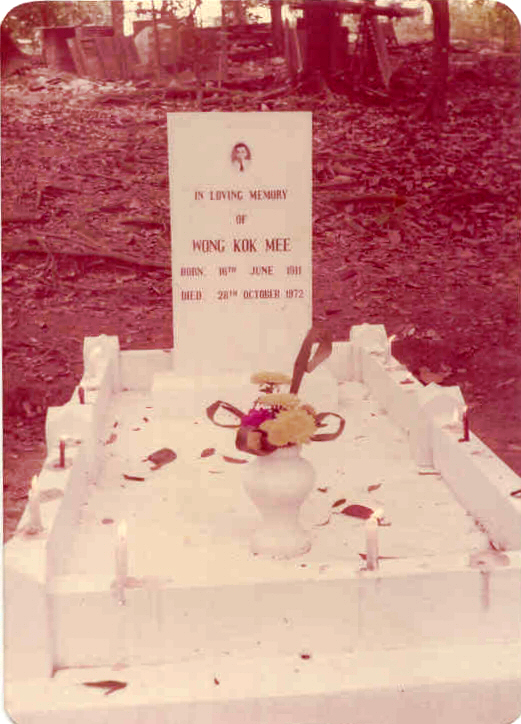
Resting place of Wong Kok Mee
Mr. Errol Seow Hoon Hin, himself a generous-hearted believer and one who was very closely associated with Kok Mee from the very early days says, “Uncle Wong Kok Mee may not be a highly educated person, but he was certainly a highly dedicated and a firm pillar of strength to institutions and individuals, deriving the spirit from Bahá’u’lláh Himself through many prayers. His understanding of the Cause was much higher than many educated.”
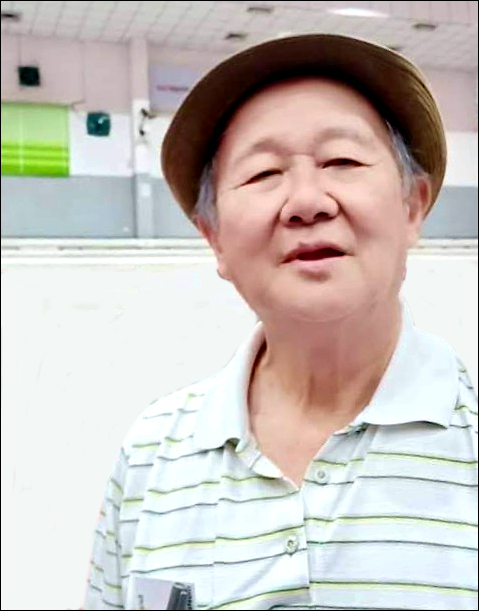
Errol Seow
The Bahá’í history of the Faith in Kuala Lumpur, and by extension, that of West Malaysia cannot be written without adequate mention of this God-intoxicated servant who was always a highly dedicated and firm pillar of strength to Institutions and individuals. He had set a high standard for individual initiative, especially in taking ownership of the Faith and its needs.
Thus ended the illustrious life of a firm and steadfast believer in the Cause, who almost single-handedly saw the development of the Kuala Lumpur community in the first fifteen years. He arose and led the way when there was nobody else by him, thus blazing an exemplary path that none could rival. Looking at the services and legacy he left behind, one is naturally inclined to agree there can never be another Wong Kok Mee!
A. Manisegaran
31 March 2021
Copyright @ bahairecollections.com